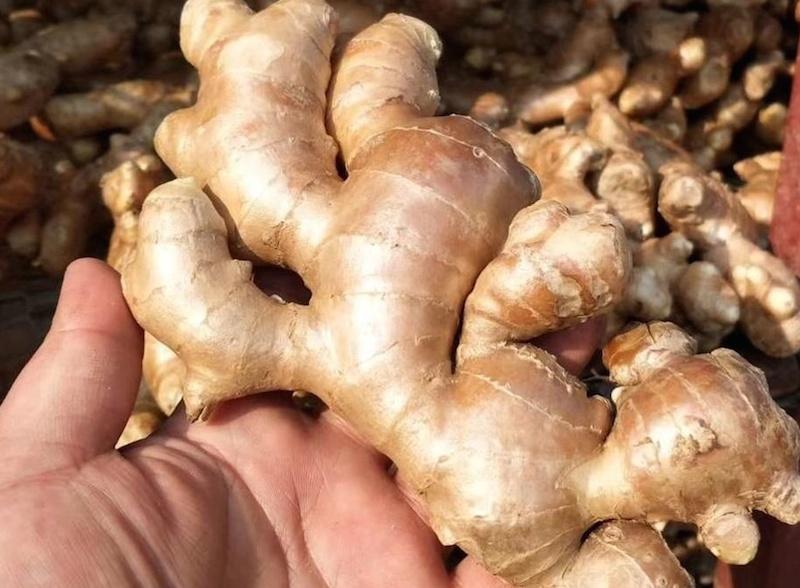In 2020, Afrobeats A-listers Wizkid and Burna Boy hopped on groovy beats to celebrate good vibes in Ginger, a track that derives from the popular African spice known for its tangy and aromatic taste.
In Nigeria pidgin, ‘ginger’ has long been likened to excitement and zest. In recent years, however, as the rhizome has shrunk in size, becoming painfully expensive, conversations about ginger have lost their spice.
This past July, when a user on X asked if others had noticed that ginger was no longer hot and aromatic, the post drew a flood of reactions. Many users likened the change to genetic modification, reviving the GMO debate that once rattled Nigerian social media.
But is genetic modification really to blame for the fading aroma?
Nigeria’s ginger boom
Nigerian ginger has long been prized around the world for its heavy oleoresin content, which lends it a tangy flavour and strong aroma.
In 2017, around 834,000 metric tonnes of ginger were produced in Nigeria, according to Statista. By the following year, the country became the third-largest producer of ginger in the world, after India and China.
Most of the crop is farmed in Kachia, a town in southern Kaduna, which prides itself as the ginger capital of Nigeria. Farms in Gombe, Nasarawa and Bauchi also help to complement production.
As demand for Nigerian ginger surged globally, the Netherlands became the largest importer of Nigerian ginger, followed by the United States, India and Saudi Arabia. Before long, the crop became Nigeria’s third-largest non-oil export.
However, that boom started to peter out in 2023, when farmers along the ginger-growing belt noticed that their plants were starting to wilt, a symptom of the blast disease.
Proxipyricularia zingiberis, a species of fungus, is known to cause tiny brown diamond-shaped lesions on the leaves, which develop into a destructive blast.
Because many growers were slow to identify the disease, it wiped off as much as 85% of the crop yield by the end of the year, leaving losses of over N12 billion, according to the Nigerian government.
Following this fungal outbreak, the price of ginger skyrocketed. A 50-kilogram bag of ginger—which cost less than N50,000 prior to the epidemic—climbed to N800,000.
The persisting rot created knock-on effects on the economy. Exports collapsed.
Between January and September 2023, Nigeria’s ginger export crashed to N6.28 billion, compared with N23.76 billion in the corresponding period of 2023, according to the Nigerian Bureau of Statistics.
Ethiopia immediately replaced Nigeria’s position on the ginger export market. Despite the shortfall in output, Nigerian ginger is still supplied to foreign countries, even as households struggle to buy the spice. Vietnam and Sudan were among the countries that imported Nigerian ginger in 2024, according to official figures.
This continuing export, stakeholders insist, worsens the crisis. The available supply of ginger is rather too limited to sate both local and international demand, thereby stoking the price of the crop.
“The yield is fast declining, and there’s very little to take to other countries. And it’s already happening to other major foods too,” says Mariam Gyang, a farmer in Jos.
The country’s declining currency may have also contributed to the mix, allowing foreigners to purchase Nigerian staples and spices at relatively cheap rates.
The Nigerian government’s ban on the export of staples doesn’t, however, include essential spices like ginger.
The government has said that putting a ban on crops like ginger may stymie the inflow of foreign exchange from non-oil commodities.
There’s a scintilla of wisdom in continuing export. Yet, to keep the cost of ginger at home in check, experts suggest placing a partial cap on its export. This ensures that it can sate its local demand while sustaining its overseas shipments.
A bitter taste
To plug the shortfall, Nigeria is said to have turned to imports, mostly Chinese ginger. But many say this variant lacks the characteristic tang of Nigerian ginger.
“This particular one [the variant from China] is not hot at all. Rather, it has a bitter taste,” says Adanna Chuks, a mother of 3 based in Calabar. “I use it whenever I want to cook agbo [herbs].”
The government’s palliative measures have brought little respite to ginger growers in the country, who continue to mourn their heavy losses.
Most have raised concern for access to quality seeds and seedlings. Replanting the seeds from diseased crops has fuelled repeated outbreaks.
Nigeria’s crisis echoes the viral disease that ravaged cassava farmland in East Africa. A coordinated campaign involving clean-seed networks, rapid diagnostics and financing greatly revived the industry.
Stakeholders say that Nigeria can take a cue from its East-African neighbours.
By restructuring its market, providing subsidies to farmers and investing in clean-seed production, it can bring back that spicy, pungent aroma to most homes again.
In 2020, Afrobeats stars Wizkid and Burna Boy celebrated the popular Nigerian slang for excitement, "ginger," in their track of the same name. Nigerian ginger was highly valued worldwide for its rich oleoresin content, which contributed to its strong aroma and tangy flavor. By 2018, Nigeria was the third-largest ginger producer globally. However, in 2023, a fungal disease devastated the ginger crop, wiping out 85% of the yield, which skyrocketed prices and led to severe economic impacts, including a crash in exports.
The epidemic forced Nigeria to import ginger, primarily from China, although it lacked the distinctive qualities of local ginger. Ongoing exports despite low supply compounded the crisis, leading to a call for export restrictions to stabilize domestic prices. Farmers lamented the lack of quality seeds, with diseased plants aggravating the problem. To revive the ginger industry, experts suggest adopting strategies from East Africa, where improved seed systems and market restructuring helped similar agricultural crises. By investing in clean-seed production and offering farmer subsidies, there is potential to rejuvenate Nigeria's ginger market.






